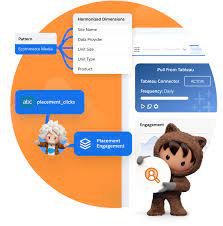What exactly is Salesforce Datorama, now referred to as Marketing Cloud Intelligence? It is a versatile, cloud-based marketing data platform offering a suite of solutions aimed at enhancing data integration, reporting, analysis, and optimization. Marketing Cloud Intelligence For Data Integration.
However, the question arises: Does Marketing Cloud Intelligence truly deliver the cloud-based Marketing Intelligence as Salesforce touts? Let’s dive into what this platform offers and dissect its capabilities without the fluff.
Understanding the Platform: Salesforce’s Marketing Cloud Intelligence, formerly known as Datorama, serves as an analytics tool meticulously designed to integrate and visualize various forms of marketing performance data. It strikes a balance, catering to both analytically inclined marketers and seasoned analysts seeking to bridge data with conventional BI tools like Tableau.
Flexible SaaS with Tailored Customization: Despite its Software-as-a-Service (SaaS) nature, Datorama surprises with its flexibility. It can function autonomously, handling data storage, modeling, ETL, and visualization, or seamlessly integrate with other platforms like Azure Databricks or Looker. While it accommodates numerous data use cases, its primary focus remains on Performance Marketing.
Marketing Cloud Intelligence often gets misclassified as a traditional Business Intelligence or Analytics platform, but it truly excels in data management. For those contemplating its adoption, familiarity with its functionalities through resources like “Getting to Know Marketing Cloud Intelligence” or video walkthroughs is encouraged.
Transition to Marketing Cloud Intelligence: The rebranding from Datorama to Marketing Cloud Intelligence was proposed in early 2022, gaining momentum recently. Despite the name change, the platform’s features and capabilities remain intact.
Origins and Evolution: Originating from an Israeli-based technology firm in 2012, Datorama swiftly gained traction under the stewardship of its founders Ran Sarig, Efi Cohen, and Katrin Ribant. In 2018, Salesforce acquired Datorama, integrating it into the Marketing Cloud suite alongside Account, Engagement, Personalization, and Data Cloud platforms. However, as of February 2, 2023, the original founders and core engineering teams have moved on, possibly signaling a shift in the platform’s trajectory.
Functionalities and Capabilities: Marketing Cloud Intelligence boasts robust data onboarding and connectivity features, with a rich assortment of connectors and retrieval mechanisms supporting popular data management platforms like SAP Hana, AWS, Oracle, Vertica, and SQL Server. It excels in ingesting and managing aggregated marketing performance data, with the capacity to handle event-level data as well.
Pricing and Competitors: While its pricing model revolves around data row consumption and user seats, the platform may become cost-prohibitive at higher volumes. However, recent enhancements like Data Lake offer expanded row count flexibility without escalating costs. Its primary competitors include Domo, Adverity, NinjaCat, Improvado, Looker, PowerBI, and Google Data Studio.
Use Cases and Industries: Marketing Cloud Intelligence serves marketers and advertisers across various industries, including communications, media, technology, healthcare, finance, manufacturing, automotive, retail, and publishing. Its versatility lies in supporting six specific marketing data use cases, ranging from building a single source of data to producing informative dashboards.
Continuous Evolution: With frequent product releases, Marketing Cloud Intelligence remains dynamic, adapting to evolving market needs and technological advancements. Its commitment to enhancing analytics, visualization, connectivity, and marketplace apps ensures its relevance in the ever-changing landscape of marketing data management.
Future Outlook: As Salesforce navigates the competitive analytics space, the future of Marketing Cloud Intelligence remains intriguing. While challenges like pricing pressures persist, the platform’s integration within the Marketing Cloud ecosystem and ongoing enhancements hint at a promising trajectory. Whether it evolves into a fully integrated analytics solution or retains its standalone utility, only time will tell. But one thing is certain: Salesforce’s promotion of Marketing Cloud Intelligence will continue to shape its evolution and market positioning moving forward.













